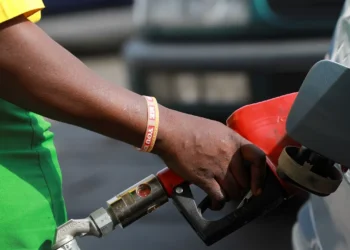Nigeria stands at a crossroad as President Bola Tinubu’s economic reforms reshape the nation’s financial landscape. From ending the fuel subsidy regime to implementing currency reforms, these decisions promise macroeconomic benefits while raising questions about their impact on ordinary Nigerians. As the nation grapples with the consequences of these reforms, a critical inquiry arises: Are Tinubu’s economic changes nurturing or endangering Nigeria’s economic health?
Fuel Subsidy Removal: A Double-Edged Sword
The aftermath of President Tinubu’s decision to abolish the fuel subsidy regime has brought both chaos and hope. In just four weeks, the gasoline price surged from 190 to 550 naira per liter, causing daily consumption to plummet by 18.5 million liters. In Nigeria, more than 22 million gasoline generators power 26 percent of households and 30 percent of small businesses. Fuel price hikes caused the price of common goods to soar, grinding businesses. The ramifications were felt across the nation, affecting households and small businesses heavily reliant on gasoline generators. However, proponents argue that the move addresses vulnerabilities in the subsidy system, aligning with the International Monetary Fund’s (IMF) and World Bank’s calls to end the policy.
Fuel Scarcity Amid Oil Abundance
Nigeria’s paradox as Africa’s largest oil producer lacking functional refineries exacerbates the fuel crisis. The nation’s four major refineries remain inactive due to poor maintenance, compelling crude exports for refining abroad. The anticipated inauguration of a new refinery near Lagos offers a glimmer of hope, yet skepticism remains regarding its potential impact on prices.
Currency Reform: Balancing Macro and Micro Effects
Tinubu’s currency reforms aimed to bolster Nigeria’s economy by abandoning the fixed naira rate in favor of a “floating” rate influenced by supply and demand dynamics.
Tinubu’s government rolled out a currency reform to stop the naira’s rate from being fixed by the country’s central bank and pegged to the U.S. dollar, giving way to rates determined by supply and demand, a policy known as “floating.” Tinubu’s move to kill both birds with one stone constitutes his attempt to rebuild the country’s economy, a key campaign promise. The effects of these decisions could, in theory, help Nigeria on a macroeconomic level by reducing its national debt—at the price of harming regular Nigerians.
Since the government floated the currency, the naira has plummeted to record lows against the dollar. The fixed rate, which used to be 450 naira per dollar, rose as high as 800 naira per dollar. Floating the naira immediately drove up the prices of imported goods and services, devastating small businesses and low-income households due to Nigeria’s import-dependent economy. Companies that distribute electricity have increased tariffs by 40 percent in an effort to make up for the naira’s loss of value.
Nigerians could theoretically work around this by selling naira at black-market rates, but the difference between the official float rate and the black market is not as wide as it used to be. Before the change, official rates were pegged at 450 naira per dollar, and black-market rates could be 700 naira. As of this writing, the black-market rate is at N900/$, while the floating rate is 762 naira across all sectors.
Hope Amid Challenges: Navigating the Transition
Tinubu’s timing in pursuing currency policy change aligns with market sentiments calling for an end to artificial exchange rates. Acting CBN governor emphasizes the importance of attracting foreign investors and curbing forex scarcity through market-driven naira valuations. However, the immediate hardships experienced by ordinary Nigerians battling inflation, unemployment, and external shocks like the Russia-Ukraine conflict raises skepticism about the immediate positive impact of these reforms.
Voices from the Ground: Nigerians Speak Out
In bustling markets like Ado-Ekiti and Ilorin, citizens bear the brunt of economic changes. Small business owners like Janet Omole and Olamilekan Abdulsalam share their struggles to sustain livelihoods amid soaring prices.
Imposing a new tax on the informal economy is ill-timed, according to Stanley Achonu, the Nigeria country director at the ONE Campaign, an international organization working to end extreme poverty.
“Nigerians predominantly engage in the informal sector and are still grappling with the repercussions and hardships resulting from the subsidy removal. Introducing any supplementary tax would further burden the citizens,” he said.
According to Ikemesit Effiong, the head of research at SBM Intelligence, a Lagos-based geopolitical risk advisory firm, the latest policy did not come as a shock.
“There have been a lot of moves signaling, for months, that there would be a policy shift. There have been more conversations for more than a year about the fuel subsidy and the FX regime, and that sort of primed Nigerians,” he said.
“I come to my stall every day because I just cannot sit at home at a time like this. I and the kids manage whatever food we are able to get. How we have been eating is a total miracle—that is the only way I can explain it,” Omole said.
In Ilorin, Olamilekan Abdulsalam, a tricycle taxi driver, is barely able to feed his family because his income has dropped significantly since the new policies were announced. These days, he eats more garri, cassava-derived flakes soaked in water and eaten with groundnuts and sugar.
While experts acknowledge the rationale behind certain reforms, they caution against disregarding the human cost, underscoring the urgent need for targeted government interventions to alleviate mounting pressures on low-income households.
Balancing Progress and Realities
As Nigeria navigates through the intricacies of Tinubu’s economic reforms, the nation faces a delicate balance between macroeconomic strategies and the immediate well-being of its citizens. While aspirations of attracting foreign investments and addressing long-standing vulnerabilities are valid, the urgency of cushioning the impact on everyday Nigerians cannot be overstated. As the nation grapples with this critical question, the ultimate success of these reforms will hinge on their ability to uplift the lives of all Nigerians, bridging the gap between economic aspirations and on-ground realities.










